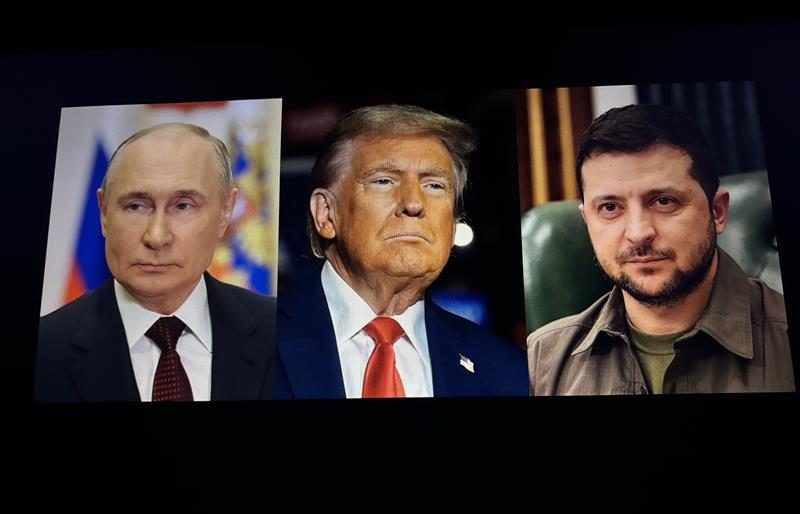Though Russian news media celebrated an “upcoming victory” after the US-Russian summit in Anchorage, Alaska, state-backed media and Russian officials laid the informational groundwork to shift blame to Ukraine and Europe if negotiations stall, go in an unfavorable direction, or fall apart. This suggests that Moscow is prepared for and ready to take advantage of a failure to secure a peace deal with Washington and Kyiv.
Blaming Ukraine and Europe
Following the Alaska summit, TASS reported that Russian President Vladimir Putin expects that Ukraine and Europe will not “create obstacles to the emerging progress” to settle the “Ukrainian crisis”. However, Deputy Chairman of the Security Council of Russia Dmitry Medvedev highlighted that “the main point” is that “both sides [the United States and Russia] have directly placed the responsibility for achieving future negotiation results and ending hostilities on Kyiv and Europe”. When Ukrainian President Volodymyr Zelenskyy and European leaders arrived in Washington for negotiations, Russian Ministry of Foreign Affairs (MFA) Spokeswoman Maria Zakharova bemoaned that the “coalition of the willing” reanimated the idea of Western peacekeeping troops in Ukraine. She appealed to London to “avoid risky gambits” and to “not interfere” in the work of Russian and American negotiators. In response to European Commission High Representative Kaja Kallas’ comment that “Putin cannot be trusted to honor any promise or commitment”, Russian Foreign Minister Sergei Lavrov described European diplomacy as a “degradation of foreign-policy methods”. Lavrov further noted that the Trump administration, unlike European officials, strives to understand “the root causes” of the war and does not simply support “beautiful words about an immediate ceasefire”.
Warning About Provocations Against Russia
Prior to the negotiations, the Russian Ministry of Defense claimed that Ukraine’s armed forces had planned a provocative strike on a densely populated residential area in Ukraine’s Kharkiv region to blame Russia and create a “negative media backdrop”. (No such attack took place before the summit.) On Monday, when Zelenskyy and European leaders arrived in Washington, Russian propaganda outlets ignited debate about Ukrainian strikes against the Druzhba pipeline that supplies Hungary and Slovakia with Russian crude oil. A guest on RT labeled the strike a “terrorism act” that suggests Ukraine “does not want peace”. Commenting on the attack, Zakharova branded Zelenskyy an “immoral” and “bloodthirsty monster” who will “never stop”. Another RT report described the strike as “Ukraine’s latest escalation” and an “attack on Trump personally” because this strike would allegedly undermine the ongoing US-led negotiations.
On Monday, Russia’s Federal Security Service (FSB) claimed that it had foiled Ukrainian special services’ attempt to attack the Crimean Bridge. TASS reported that a car loaded with explosives had arrived in Russia from Ukraine by transit through Georgia. According to TASS, the driver would then unknowingly detonate the explosives while passing the bridge connecting mainland Russia with occupied Crimea. Renat Karchaa, whom TASS describes as an “advisor to the head of the Republic of Crimea”, speculated that this plot was meant to “enrage Putin” and was promoted by “the collective West”, mainly the United Kingdom, Germany, and France. On Wednesday, FSB yet again “busted” a purportedly “Western-trained” Ukrainian sabotage-and-reconnaissance group, which this time supposedly “planned terrorist attacks” against transport infrastructure in Russia’s Bryansk region.
Conclusion
European leaders hoped for a “last-word” advantage in negotiations with Trump, yet the Kremlin is trying to turn their involvement into a liability. Touting the success of the US-Russian summit, the Kremlin put the onus on Ukraine and the EU to make progress in the peace talks, all while Russia continues its offensive in Donbass and its bombardment of Ukrainian cities. This tactic buys time, creates a semblance of good will, and likely discourages the Trump administration from threatening Russia with new tariffs. On the other hand, if negotiations progress in a way Moscow views as unfavorable to its interests, it can blame alleged “provocations” or false-flag scenarios that Russia’s FSB is now producing almost daily. In this case, the Kremlin could declare that Ukraine, with Western help, thwarted peace talks and that any future progress is impossible or requires additional concessions. It seems that after its diplomatic success in Alaska, Russia is preparing for a stalemate, which would be hard to break without decisive and consistent actions from across the West.
The views expressed in GMF publications and commentary are the views of the author alone.





